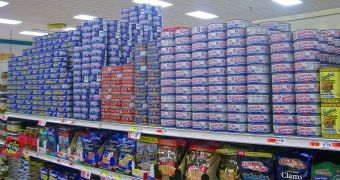Currently, Italy has one of the most prosper canned tuna markets in Europe. The entire industry flourishes, bringing a more than decent profit to major brands operating in this line of business.
A recent report indicates that 140.000 tons of tuna are sold every year. Greenpeace notes the manufacturing companies that increase their profit margins by selling this popular product keep a few unsustainable secrets, reports the organization.
After closely monitoring 2.000 cans of the most popular brands available in 170 retail commercial facilities, Greenpeace officials revealed an alarming conclusion. No consumer knows for sure what he is really eating or paying for, since only 7% of the brands analyzed decided to indicate the source of the tuna on the label.
Surprisingly, only 3% considered necessary and appropriate to reveal the methods used to catch fish. The organization has previously revealed that fisheries often engage their efforts in acts of animal cruelty, killing other marine creatures in the process of fishing for tuna.
Even when they could use sustainable fishing gears that do not put the wildlife representatives at great risk, some companies carry on with the centuries-old risky methods.
At this point in time, no Italian manufacturing company plans to launch on the market a product containing responsibly-caught tuna. Major brand AsdoMar appears to be the only enterprise interested in greening up its name, since it offers “sustainably-sourced pole and line caught skipjack tuna” in up to 50% of its goods.
The rest of the big players in this industry still increase their sale numbers while putting in danger the wellbeing of shark and turtle populations, as “non-target species” or better yet, misfortunate victims accidentally caught in their nets.
Riomare, one of the most known and appreciated brands of this kind is accused of adopting a poor product labelling. The company only lets its buyers know they are eating tuna.
No other clues are offered, meant to highlight the methods used or the source. MareAperto STAR and Nostromo are also highly criticized for lack of precious information, as Greenpeace officials suspect such notorious brands could actually hide a series of environmental crimes.

 14 DAY TRIAL //
14 DAY TRIAL //